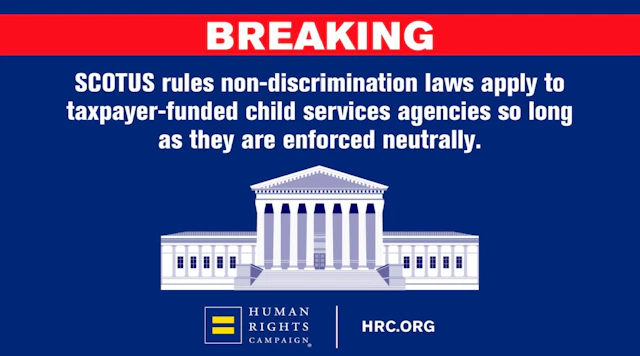
The Human Rights Campaign Reacts to Supreme Court Decision in Fulton v. City of Philadelphia
by Aryn Fields •

HRC responded to the Supreme Court’s decision on Fulton v. City of Philadelphia, a case regarding whether taxpayer-funded foster care agencies can discriminate against LGBTQ people based on religious beliefs. In a 9-0 decision, the Court ruled that governments can enforce nondiscrimination laws as long as they do so neutrally, but that the city of Philadelphia was not neutral in its application of its nondiscrimination laws.
BREAKING: #SCOTUS has ruled non-discrimination laws apply to taxpayer-funded child services so long as they are enforced neutrally but that Philadelphia’s law was not neutral. pic.twitter.com/COfLsBfghM
— Human Rights Campaign (@HRC) June 17, 2021
“Though today’s decision is not a complete victory, it does not negate the fact that every qualified family is valid and worthy—children deserve a loving, caring, committed home,” said Alphonso David, Human Rights Campaign President. “We celebrate the LGBTQ families who are dedicated to providing homes to the thousands of children in the child welfare system. Yet we know there is more work that must be done to ensure that the best interest of the child is always prioritized, including through family reunification. And there is more work to be done to ensure that LGBTQ people do not face discrimination anywhere in the country in every aspect of public life—our next step is to pass the Equality Act.”
Today, #SCOTUS has ruled that governments can enforce nondiscrimination laws as long as they do so neutrally, but determined that Philadelphia’s law was not neutral.
— Alphonso David (@AlphonsoDavid) June 17, 2021
Every qualified family is valid and worthy—children deserve a loving, caring, committed home.
Fulton v. City of Philadelphia evaluated whether foster care agencies that receive government funds could violate city law and discriminate against prospective parents based on the agency’s religious beliefs. The case could have had a sweeping, harmful impact in the provision of child welfare services by enabling discrimination against LGBTQ people, same-sex couples, interfaith couples, single parents, married couples in which one prospective parent has previously been divorced, or other qualified parents to whom an agency has an objection. The Supreme Court determined that enforcing nondiscrimination laws is not in conflict with the First Amendment, but determined that the city of Philadelphia was not neutral in applying its nondiscrimination provisions.
The biggest barrier to placing children with families is a lack of qualified prospective parents. If the Court had given taxpayer-funded agencies a license to discriminate, thereby limiting the pool of prospective parents for no legitimate reason, this would further shrink the pool of qualified prospective parents.
According to new data from PRRI, a very broad majority of Americans (70%) oppose allowing religiously affiliated agencies that receive taxpayer funding to refuse to accept qualified gay and lesbian couples as foster parents, including 31% who strongly oppose it.
Many of the country’s top child welfare organizations have spoken out in opposition to state governments’ attempts to enshrine anti-LGBTQ discrimination into the provision of child welfare services around the country. Those groups include the Child Welfare League of America, North American Council on Adoptable Children, National Center for Adoption and Permanency, Foster Club and Voice For Adoption.
The Human Rights Campaign released an updated report, titled Disregarding the Best Interest of the Child: Why Creating Licenses to Discriminate for Government Contractors Hurts Children in the Child Welfare System, detailing the harms of efforts to enshrine anti-LGBTQ discrimination by child welfare agencies into law. Statistics suggest that an estimated two million LGBTQ adults in the U.S. are interested in adoption, but the LGBTQ community often remains an untapped resource when it comes to finding families for children and youth in foster care.
Research consistently shows that LGBTQ youth are overrepresented in the foster care system. Compounding the inherent trauma of foster care, many LGBTQ youth in foster care have experienced rejection by their families of origin because of their LGBTQ status, only to then be further traumatized by discrimination and mistreatment while in foster care.
- Topics:
- SCOTUS
Love Conquers Hate
